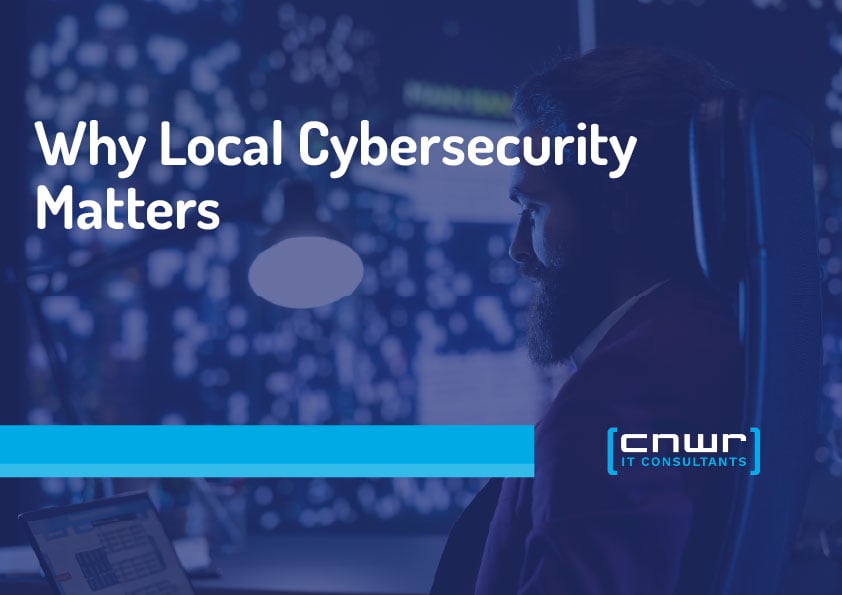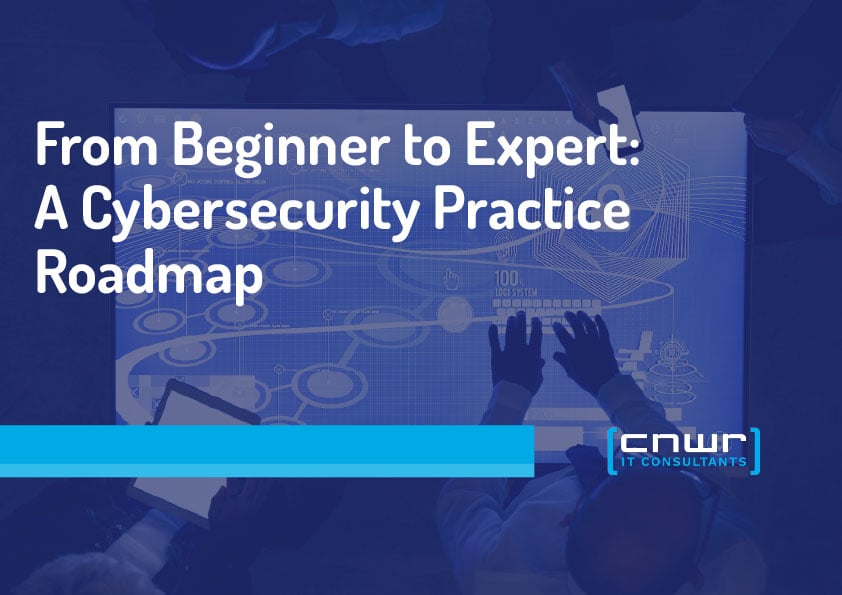When was the last time you thought about what you’d do if your business laptop started showing more pop-ups than a carnival? Or if you opened your bank app only to discover your company account had performed a disappearing act? For most small business owners, cybersecurity is something you plan to look into right after you fix the printer, balance the books, and figure out what’s happening with the WiFi. The trouble is, cybercriminals don’t wait until it’s convenient for you.
This post will break down the basics of cybersecurity for small businesses, and more importantly, show you why investing in local cybersecurity support is the best insurance policy you didn’t know you needed.
A Cyber Attack Walks Into a Small Business....
If cybercrime stats were a bedtime story, no one would sleep again. Nearly half of all cyberattacks target small businesses. Why? Because criminals know you’re probably too busy juggling day-to-day operations to build digital fortresses like the Fortune 500 crowd.
You might think hackers are only interested in banking giants or mysterious government agencies. Yet 43 percent of all cyberattacks hit small businesses, according to BD Emerson’s latest report. And if you believe your business size makes you immune, think again. Many cybercriminals view smaller companies as low-hanging fruit with just enough data to make it worth their while and far fewer resources for defense.
If that’s not enough to set off your internal alarm bells, consider this cheerful tidbit: 60 percent of small businesses that fall victim to a cyberattack close their doors within six months. These attacks drain funds, wreck reputations, and can lead to lawsuits faster than you can say “password123.”
Think You're Too Small to Get Hacked? Think Again
Hoping for the best isn’t a security strategy. Hackers aren’t polite guests; they don’t knock. They’ll come in through unlocked digital doors you didn’t know existed. Here’s why “winging it” in cybersecurity is an invitation for disaster:
The Financial Fallout Is RealThe average small business breach costs $254,445 (sometimes up to $7 million), and that’s not just loose change. Even less dramatic invasions, like ransomware attacks, tend to cost around $84,000 to recover—not including lost business and customer trust.
Your Reputation Is on the LineClients trust you with their data. One leak, and you risk becoming “that company” people gossip about online for all the wrong reasons. Surveys show that more than half of consumers would rather take their business elsewhere than risk a repeat breach.
Legal Requirements Love PaperworkThere are more data privacy laws than coffee mugs in your break room. Regulations like GDPR and CCPA expect you to keep your customers’ information secure. Failing that, hefty fines await. Non-compliance is rarely forgiven (and never forgotten by auditors).
Supply Chain SurprisesEven if your business is as secure as Fort Knox, one vulnerable vendor can turn your systems into an open house. Third-party breaches account for over half of all business data breaches. You’re not just protecting yourself; you’re guarding your partners, too.
The Local Advantage: What Nearby Cyber Pros Bring to the Table
Cybersecurity might sound complicated, but resolving issues shouldn’t require submitting a ticket to a help desk three time zones away. Nearby support gives you immediate help, context-aware solutions, and builds relationships that can save you when minutes matter.
Imagine your network goes haywire at 10 a.m. on payroll day. Would you rather:
- Wait for “Chad” from overseas to finish his lunch and start his shift,
- Or have a team who can be at your door before you’ve finished that desperate cup of coffee?
Here’s what local cybersecurity support delivers that remote providers often miss.
1. Personalized, Context-Driven Protection
Local teams understand your specific risks because they work with companies just like yours. They’re familiar with the data compliance quirks in your region and sector, giving tailored advice no generic software can match. The difference is like asking a barista for a flat white instead of a random cup of something resembling coffee.
2. Fast, Reliable Help Exactly When You Need It
When a potential breach turns your screen blue, you want help now, not after the “estimated wait time of 117 minutes.” On-site support means problems are solved faster, saving you money and stress. Whether you need advice, urgent troubleshooting, or just someone to confirm your wired mouse isn’t a “hardware exploit,” local support has your back.
3. Trusted Relationships, Not Faceless Emails
Ever tried explaining your business needs to a chatbot? Relying on a provider you can meet face-to-face makes collaboration effortless and allows for proactive solutions. Good cybersecurity isn’t about just reacting; it’s about partners who know your people, your systems, and that your password shouldn’t be “password.”
4. Certified Compliance, Without the Jargon
Most audits ask you to demonstrate security controls that no one can pronounce, much less implement. Local professionals translate regulatory alphabet soup into action steps. Staying compliant means you avoid fines, plus you get those reassuring checkmarks clients look for.
The Most Common Threats Knocking at Your Door
Still think you’re underestimated by hackers? Here are everyday attack types that trip up even the most conscientious business owners.
Phishing: That email that looks scarily legitimate from your bank is probably not. Over 80 percent of ransomware attacks use phishing as their entry point.
Malware: All it takes is one wrong click for malicious software to waltz through your system.
Ransomware: Suddenly, your business data is encrypted, there’s a timer ticking, and some digital extortionist wants Bitcoin. Yes, it happens—even to the bakery down the street.
Insider Threats: Sometimes the bad guy is the barista. Well-intentioned employees can accidentally open a digital Pandora’s box, often through weak passwords and clicking links they shouldn’t.
Third-Party Risks: You outsource a job, grant system access, and just like that, a vendor’s weak login brings trouble to you.
Remember, one weak point is all it takes for things to go very wrong.
Building a Culture of Cybersecurity
You can buy all the software in the world, but none of it will matter if Bob from accounting still writes his password on a sticky note. Nearly all breaches involve some degree of human error. Security training must be ongoing and practical. Employees should know:
- How to recognize suspicious emails
- Why password123 is not, in fact, a password
- That two-factor authentication isn’t just another “annoyance from IT”
- Who to turn to first when something seems off
A culture of cybersecurity means everyone is a gatekeeper. The cost of ignorance here is astronomically higher than the price of a good lunch.
Practical Cybersecurity Without the Enterprise Price Tag
“But cybersecurity is for big businesses!” you might protest. Not so fast. Prevention is always cheaper than the cost of a breach. Local support can get you set up with:
- The right security software, firewalls, and anti-malware tools,
- Regular backups run quietly in the background,
- Ongoing employee training,
- 24/7 monitoring (so yes, you can sleep at night).
Instead of DIY-ing your cybersecurity (spoiler alert: this rarely goes well), think of working with local experts as hiring a personal chef after too many kitchen fires.
What's Next?
If you’re a small business owner and the closest thing you have to cybersecurity is hoping your dog will bark at unsolicited emails, it’s time to act. Investing in credible, local cybersecurity isn’t just good business sense; it’s a good survival strategy.
The right partner will customize their solutions to your business, answer your questions, and start building your digital defenses today, not next year.
Cybersecurity Isn’t a Someday Problem. It’s a Right-Now Move
Data breaches, malware infections, phishing, compliance headaches, lost trust, and yes, the end of your business, are all realistic consequences of neglecting cybersecurity. But there’s a better way. CNWR has helped businesses across the region protect themselves from digital disaster with local expertise, rapid support, and the human touch that makes all the difference.
Get in touch with CNWR for a cybersecurity checkup tailored to your business. Don’t wait for “something bad” to happen. Secure your business, your data, and your peace of mind, starting now.




